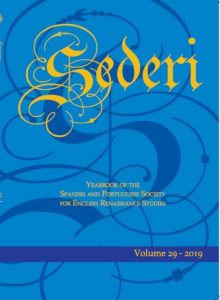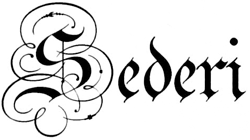
Sederi 29
Sederi 29 — 2019
EDITOR
Ana Sáez-Hidalgo
MANAGING EDITOR
Keith Gregor
REVIEW EDITOR
María José Mora
ISSN 1135-7789
Delilah Bermudez Brataas, “The blurring of genus, genre, and gender in Margaret Cavendish’s utopias.” SEDERI 29 (2019): 35–59.
DOI: https://doi.org/10.34136/sederi.2019.2 Download PDF
Abstract
The Blazing World was the first utopia in English written by a woman, and likely, the first science fiction text in English. Yet it was not Margaret Cavendish’s only utopic text. The separatist spaces of her plays, and the virtual communities of her epistolary collections, were earlier utopias that contributed to her construction of Blazing World. Cavendish established the characteristics of utopian literature through the transgression of categories and hybridity. I consider her blurring of genus, genre and gender in two of her utopic texts, Sociable Letters and Blazing World, and her strategic development of the blurring of these categories.
Keywords: Margaret Cavendish; utopias; gender; genre; genus.
References
Bakhtin, M. M. 2017. The Dialogic Imagination: Four Essays. Austin: University of Texas Press.
Bynum, Caroline Walker. 2001. Metamorphosis and Identity. Ann Arbor, University of Michigan: Zone Books.
Butler, Judith. 1990. Gender Trouble. New York and London: Routledge.
Cavendish, Margaret. 1655a. Philosophical and Physical Opinions. London: J. Martin and J. Allestryre.
Cavendish, Margaret. 1655b. The World’s Olio. London: J. Martin and J. Allestryre.
Cavendish, Margaret. 1886. The Life of William Cavendish Duke of Newcastle: To Which Is Added the True Relation of My Birth, Breeding, and Life. Edited by C.H. Firth. London: John C. Nimmo.
Cavendish, Margaret. 1997. Sociable Letters. Edited by James Fitzmaurice. London: Garland Publishing.
Cavendish, Margaret. 2004. The Blazing World and Other Writings. Edited by Kate Lilley. London: Penguin.
Cavendish, Margaret. 2018. Poems and Fancies with The Animal Parliament. Edited by Brandie R. Siegfried. Tempe, Arizona: Iter Press.
Cottegnies, Line, and Nancy Weitz. 2003. Authorial Conquests: Essays on Genre in the Writings of Margaret Cavendish. Cranbury, NJ: Associated University Presses.
Descartes, René. 1985. The Philosophical Writings of Descartes. Volume 1. Translated by John Conttingham, Robert Stoothoff, and Dugald Murdoch. Cambridge: Cambridge University Press.
Deutsch, David. 2012. The Beginning of Infinity: Explanations That Transform the World. New York: Penguin.
Gaiman, Neil, and Kazuo Ishiguro. 2015. “‘Let’s talk about genre’: Neil Gaiman and Kazuo Ishiguro in Conversation.” New Statesman American, June 4. Accessed on June 28, 2019. http://www.newstatesman.com/2015/05/neil-gaiman-kazuo-ishiguro-interview-literature-genre-machines-can-toil-they-can-t-imagine
Haraway, Donna. 1991. “A Cyborg Manifesto: Science, Technology, and Socialist-Feminism in the Late Twentieth Century.” In Simians, Cyborgs, and Women: The Reinvention of Nature, 149–81. New York: Routledge.
Lilley, Kate. 2003. “Contracting Readers: ‘Margaret Newcastle’ and the Rhetoric of Conjugality.” In A Princely Brave Woman: Essays on Margaret Cavendish, Duchess of Newcastle, edited by Stephen Clucas, 19–39. Aldershot, Burlington: Ashgate.
Oswald, Dana. 2010. Monsters, Gender, and Sexuality. Suffolk: Boydell and Brewster.
Pepys, Samuel. The Diary of Samuel Pepys. Accessed April 21, 2018. https://www.pepysdiary.com/
Poole, Joshua. 1657. The English Parnassus: or, A Helpe to English Poesie. London: Printed for Tho. Johnson.
Quinsee, Susannah. 2000. “Margaret Cavendish’s Critical Heritage and the Creation of an Infamous Gendered Literary Identity.” In-between: Essays and Studies in Literary Criticism 9 (1–2): 89–105.
Romack, Katherine M. 2000. “Margaret Cavendish, Shakespeare Critic.” In A Feminist Companion to Shakespeare, edited by Dympna Callaghan, 21–41. Oxford: Blackwell Publishers.
Sarasohn, Lisa T. 2003. “Leviathan and the Lady: Cavendish’s Critique of Hobbes in The Philosophical Letters.” In Authorial Conquests: Essays on Genre in the Writings of Margaret Cavendish, edited by Line Cottegnies and Nancy Weitz, 40–58. Cranbury: Associated University Presses.
Sawyer, Robert. 2003. Victorian Appropriations of Shakespeare. Madison: Farleigh Dickinson University Press.
Tomlinson, Sophie. 1992. “My Brain the Stage: Margaret Cavendish and the Fantasy of Female Performance.” In Women, Texts, and Histories: 1575–1760, edited by Clare Brant and Diane Purkiss, 133–62. London, New York: Routledge.
Walters, Lisa. 2014. Margaret Cavendish: Gender, Science, and Politics. Cambridge: Cambridge University Press.
Whitaker, Katie. 2002. Mad Madge: The Extraordinary Life of Margaret Cavendish, Duchess of Newcastle, the First Woman to Live by Her Pen. New York: Basic Books.
Wolfe, Charles T. 2013. “Vitalism and the Resistance to Experimentation on Life in the Eighteenth Century.” Journal of the History of Biology 46 (2): 255–82.
